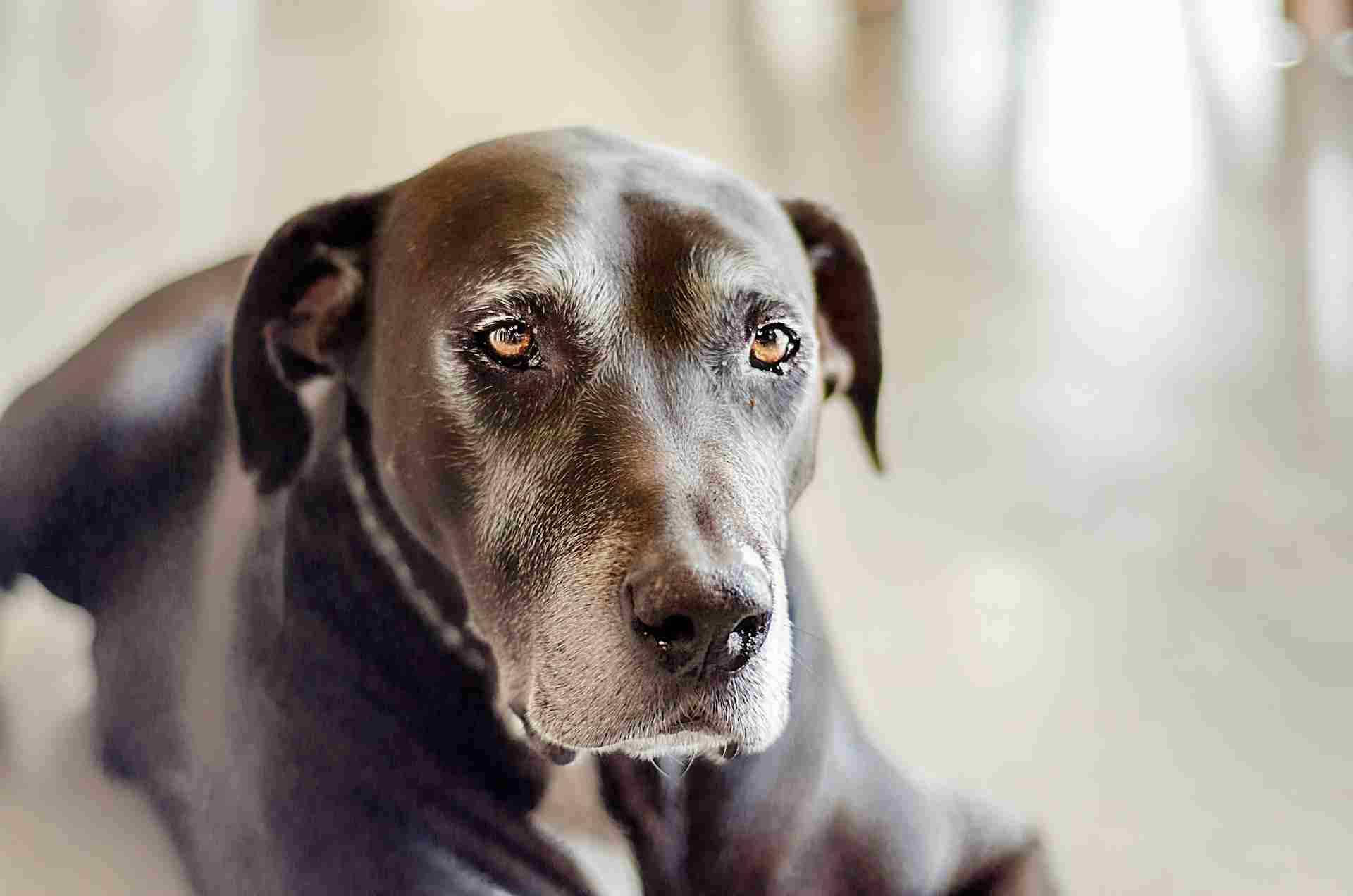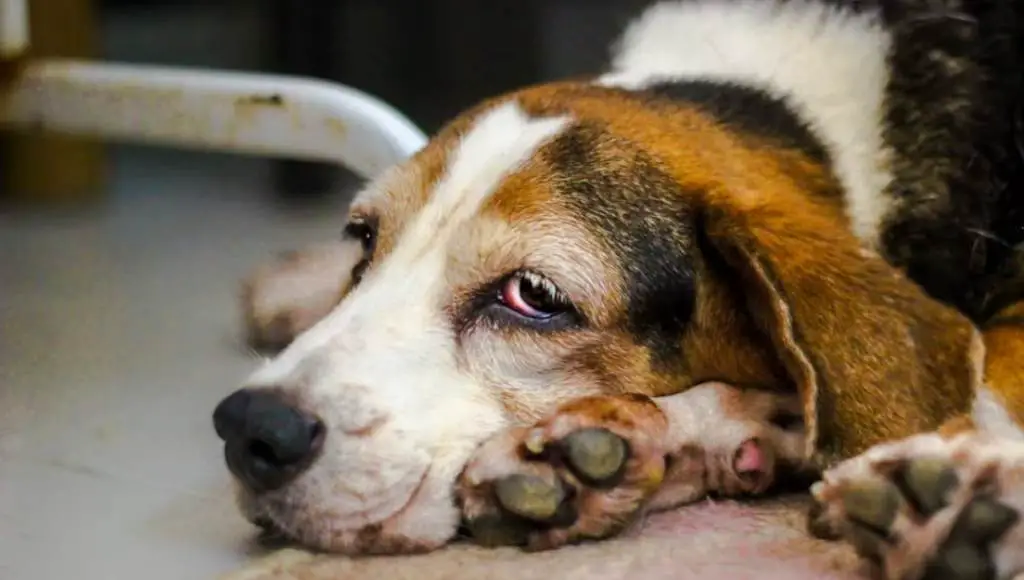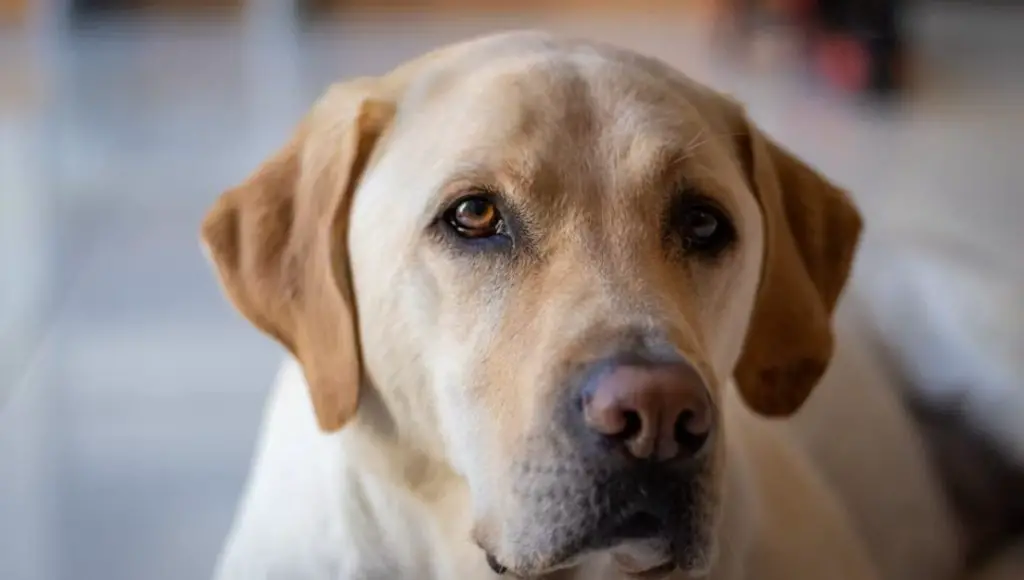12 Reasons For Your Old Dog Farting a Lot With Tips

Are you dealing with a senior furry friend who’s letting out some seriously stinky gas? Well, you’re not alone!
In this blog post, we’ll dive into the fascinating world of old dog farting and explore some practical tips to help your canine companion and your nose find some relief.
So, buckle up and get ready to tackle those pungent puffs together!
Old Dog Farting a Lot
Your old dog may be farting so much due to changes in their digestive system as they age and the breakdown of food in the intestinal tract, which releases stinky hydrogen sulfide gas as a by-product of digestion.
Another reason could be that your older dog is swallowing a lot of air when eating or drinking, especially if they are a speed-eater or a short-nosed brachycephalic breed.
Additionally, excessive or foul-smelling flatulence can be a sign of a health issue, such as inflammatory bowel disease, tumors, irritable bowel syndrome, pancreatic disease, or gastrointestinal disease.
A poor quality diet, change in diet, or food intolerance can also cause flatulence in older dogs.
If your older dog is experiencing excessive or foul-smelling flatulence, it is important to visit a veterinarian to determine the underlying cause and receive appropriate treatment.
Common causes of excessive flatulence in older dogs

Here are some of the most common causes of excessive flatulence in older dogs:
1. Dietary Changes
Just like humans, dogs experience digestive changes as they age. If your older dog has recently switched to a new diet, it could be a potential culprit for the excessive gassiness.
Changing your dog’s food too quickly or introducing new ingredients without giving their digestive system time to adjust can lead to increased gas production.
It’s always a good idea to transition to a new diet gradually, allowing their digestive system to adapt.
2. Swallowing Air
Dogs are known to be enthusiastic eaters, and sometimes their excitement can lead to swallowing air while they’re chowing down on their meals.
This excess air in their digestive system can result in increased gas and subsequent flatulence.
Some dogs also gulp air while drinking water or during excessive panting. It’s essential to ensure your dog eats and drinks at a relaxed pace to minimize air ingestion.
3. Poor-Quality Food
The quality of a dog’s diet plays a significant role in their overall digestive health.
Feeding your older dog low-quality or inappropriate food can lead to gastrointestinal issues, including excessive flatulence.
Poor-quality food may contain fillers, artificial additives, or ingredients that your dog’s digestive system struggles to break down effectively.
Opting for a nutritionally balanced, high-quality dog food can help alleviate gas problems.
4. Irritable Bowel Syndrome
Just like humans, dogs can develop irritable bowel syndrome (IBS).
This condition can cause symptoms such as excessive gas, bloating, diarrhea, and abdominal discomfort.
Older dogs may be more susceptible to IBS due to the natural changes in their digestive system that come with age.
If you suspect your dog has IBS, it’s crucial to consult with your veterinarian for a proper diagnosis and treatment plan.
5. Overeating
Just like humans, dogs can experience excessive flatulence if they overeat.
When older dogs consume large amounts of food in a short period, their digestive system may struggle to break down the excess food properly.
This can lead to increased gas production and, consequently, flatulence.
To address this issue, it’s essential to establish a feeding schedule and portion control based on your dog’s age, size, and activity level.
Regular exercise can also help stimulate digestion and prevent overeating.
6. Food Allergies or Sensitivities
Food allergies or sensitivities can cause digestive upset, including excessive gas in dogs.
Some common allergens for older dogs include beef, chicken, dairy products, wheat, and soy.
If your older dog is experiencing chronic flatulence along with other symptoms like skin irritation, itching, or gastrointestinal issues, it might be worth considering a food allergy or sensitivity.
Consult with your veterinarian to discuss a potential elimination diet or allergy testing to identify the specific triggers and find an appropriate diet for your dog.
7. Eating Too Quickly
If your older dog tends to gulp down their food without taking the time to chew properly, they may swallow air along with their food.
This can lead to increased flatulence. Eating too quickly can also cause other issues like choking or bloating.
To alleviate this problem, consider using puzzle feeders or slow-feed bowls designed to encourage slower eating.
These tools can help your dog pace themselves during mealtime, reducing the chances of excessive gas buildup.
8. Feeding Table Scraps
While it can be tempting to share your delicious leftovers with your furry companion, feeding table scraps may contribute to excessive flatulence.
Human food, especially fatty or spicy foods, can be difficult for dogs to digest properly.
Additionally, sudden changes in diet can upset the digestive system, leading to increased gas production.
It’s best to stick to a balanced and nutritionally complete diet formulated specifically for older dogs.
If you want to give your older dog a treat, opt for dog-friendly snacks or fruits and vegetables that are safe for canine consumption (avoid grapes, raisins, onions, and garlic as they can be toxic to dogs).
9. Bacterial Overgrowth
Ah, bacterial overgrowth, a rather funky issue when it comes to our furry friends.
You see, dogs, just like humans, have bacteria in their digestive systems.
However, when there’s an overgrowth of certain bacteria, it can lead to excessive gas production.
This overgrowth can occur due to various reasons such as dietary changes, stress, or even medications.
So, if your older dog is suddenly emitting some rather potent gas, bacterial overgrowth might be the culprit.
10. Pancreatic Insufficiency
Now, let’s talk about the pancreas. This little organ plays a crucial role in digestion, as it produces enzymes that help break down food.
However, in some cases, the pancreas may not be producing enough of these enzymes, leading to a condition called pancreatic insufficiency.
When food isn’t properly broken down, it can ferment in the intestines, causing gas buildup and, you guessed it, excessive flatulence.
So, if your elderly pooch has been tooting up a storm, a visit to the vet to check for pancreatic insufficiency might be in order.
11. Intestinal Parasites
Oh, those pesky little critters! Intestinal parasites are unwelcome guests in any dog’s digestive system.
Worms like roundworms, hookworms, or giardia can take up residence in the intestines and cause all sorts of trouble, including excessive flatulence.
These parasites can disrupt the normal digestive process and lead to gas production.
So, if you notice your senior dog passing gas more frequently and suspect that parasites might be behind it, a checkup with the vet is definitely a good idea.
12. Underlying Health Conditions
Our loyal companions can also experience various underlying health conditions that may contribute to their gassy situations.
Issues like inflammatory bowel disease, food allergies, or even certain cancers can result in increased flatulence.
These conditions can affect the normal functioning of the digestive system, leading to gas accumulation and, well, some rather pungent odors.
If you suspect that an underlying health condition might be causing your older dog’s excessive flatulence, it’s essential to consult with your veterinarian for a proper diagnosis and treatment plan.
Tips to Reduce Flatulence in Old Dogs

Here are some common tips for reducing flatulence in old dogs:
1. Adjust the Diet: First things first, take a look at your dog’s diet. Certain ingredients can contribute to excessive gas production. Consider switching to a high-quality, easily digestible dog food that contains fewer fillers and artificial additives. Consult with your veterinarian to ensure the new diet meets your dog’s specific needs.
2. Slow Down Mealtime: Wolfing down food quickly can lead to gulping air, which can result in increased flatulence. Try using puzzle toys or slow feeder bowls to make mealtime a bit more challenging and prevent your dog from inhaling their food.
3. Avoid Certain Foods: Just like humans, dogs can have specific food intolerances or sensitivities that can cause excessive gas. Common culprits include beans, lentils, broccoli, cabbage, and dairy products. Keep an eye on your dog’s reaction to different foods and eliminate any that seem to trigger excessive flatulence.
4. Smaller, Frequent Meals: Instead of feeding your dog large meals, consider dividing their daily intake into smaller, more frequent meals. This can help prevent overeating and reduce the amount of gas produced during digestion.
5. Regular Exercise: Regular exercise not only keeps your furry friend healthy but also aids in digestion. Taking your dog for daily walks or engaging in playtime can help regulate their digestive system and reduce flatulence.
6. Probiotics and Digestive Enzymes: Adding probiotics and digestive enzymes to your dog’s diet can promote healthy gut flora and aid in digestion. These supplements can help break down food more efficiently, reducing gas production.
7. Avoid Table Scraps: As tempting as it may be to share your delicious leftovers with your furry companion, avoid giving them table scraps. Human food, especially fatty and spicy dishes, can upset your dog’s stomach and lead to increased flatulence.
8. Reduce Stress: Stress and anxiety can affect a dog’s digestive system, leading to excessive gas. Create a calm and peaceful environment for your dog, provide plenty of mental and physical stimulation, and consider using calming aids if needed.
9. Regular Vet Check-ups: Lastly, don’t forget to schedule regular check-ups with your veterinarian. They can assess your dog’s overall health, identify any underlying conditions that may contribute to flatulence, and provide tailored advice.
Reducing flatulence in old dogs is all about making small but impactful changes to their diet and lifestyle.
FAQs
Why is my old dog farting so much?
As dogs age, they can experience changes in their digestion, leading to increased flatulence. This can be due to dietary changes, food sensitivities, or a decrease in digestive enzyme production.
Should I be concerned about my old dog farting a lot?
Occasional farting is normal, but if your old dog’s farting becomes excessive or is accompanied by other symptoms like diarrhea or vomiting, it’s best to consult your vet to rule out any underlying health issues.
Can diet affect my old dog’s flatulence?
Absolutely! Certain foods, especially those high in fiber or difficult to digest, can contribute to increased flatulence in older dogs. It might be worth considering a diet adjustment or discussing dietary supplements with your vet.
How can I reduce my old dog’s farting?
Making gradual changes to your dog’s diet, feeding smaller, more frequent meals, and ensuring they have regular exercise can all help reduce flatulence. Additionally, avoid feeding your dog table scraps or foods known to cause gas.
Is there a connection between health issues and excessive farting in old dogs?
While occasional farting is usually harmless, excessive or foul-smelling flatulence can sometimes signal health issues such as gastrointestinal problems, food allergies, or infections. It’s best to have your vet evaluate your dog if you have concerns.
Are there any natural remedies to help with my old dog’s excessive flatulence?
Yes, there are natural remedies like adding probiotics to your dog’s diet, feeding them smaller, more frequent meals, and ensuring they have access to fresh water and regular exercise. However, it’s important to consult your vet before trying any new remedies.
Conclusion
So there you have it, folks! If your old dog has been letting out some seriously stinky gas, don’t fret. Remember to consult with your veterinarian to rule out any underlying health issues, make sure you’re feeding your furry friend a balanced diet, and consider adding some natural remedies like probiotics to ease the discomfort. With a little love and care, you can help your old pup enjoy their golden years without the lingering aroma.
